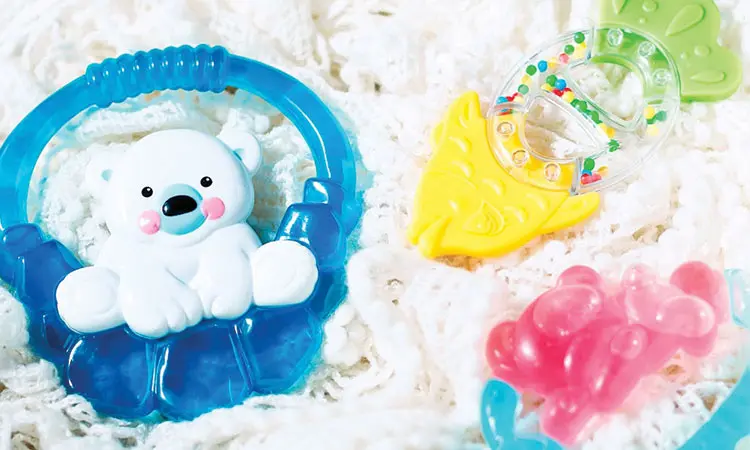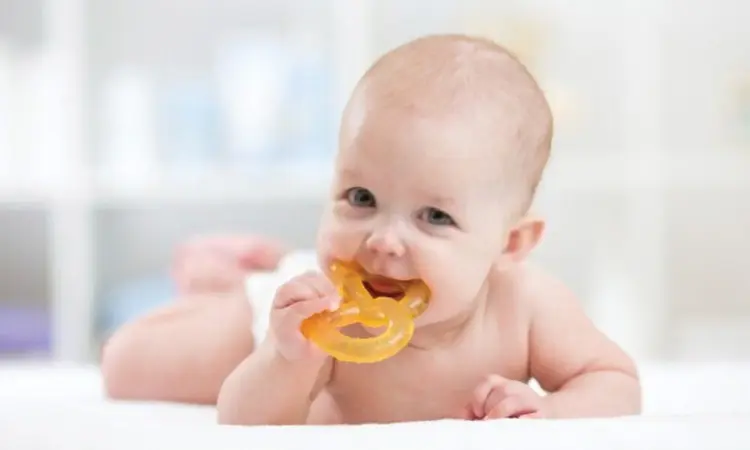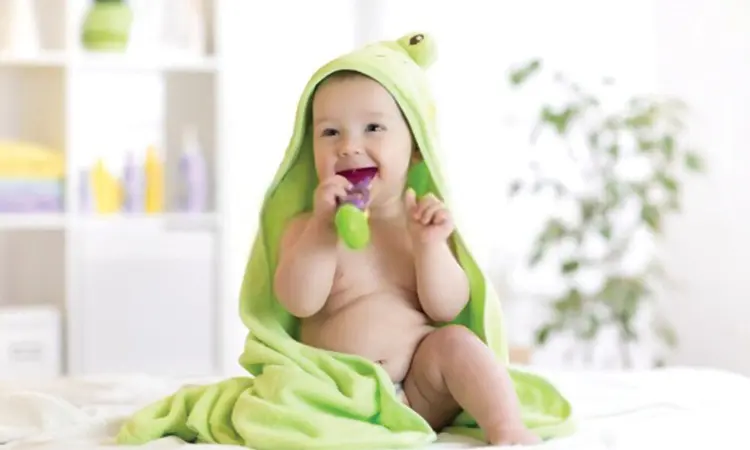Between the age of 5-8 months, babies tend to sprout their first pearly whites. During the teething phase, many families rely on different teethers to keep their baby calm and relaxed. However, are these teethers safe? While many doctors prescribe the use of soft teethers, it is critically important to be cautious yourself!
You may find many sources to know the benefits of using teethers, but the clear disadvantages of teethers for babies are shared by very few.
Don’t worry; today, we will help you with this ultimate guide to know all the disadvantages of teethers for babies.
8 Disadvantages Of Teethers For Babies
Teething is a painful and frutrationg process for a baby. Along with the associated symptoms of drooling, low grade fever, diarrhea, irritability and overall pain, teething can make a baby fussy because they do not know what’s happening.
As a parent, you want to help the baby relieve some of the pain and for that the obvious choice is perhaps the teeethers available in the market. Let’s discuss the disadvantages of teethers and safe teethers for baby.
1. Teethers can be laden with possible toxic chemicals
If the teethers show products without BPA written on it, the odds are that it has the poisonous synthetic included in it. The compound BPA is a chemical substance that upsets your endocrine system.
The use of this chemical has been prohibited from cups and containers. You may wonder, “Is teether safe for baby?” well, it all depends on the materials that go into its making.
In 2016, an examination was performed where numerous teethers named without BPA were actually found to be positive for the substance. To guarantee that your child isn’t biting on something that contains this harmful compound or others, it’s ideal for evading all plastic teethers.
2. Leaking liquid from teethers

Teethers made from plastic frequently have a fluid in them that permits you to freeze it prior to offering them to your kid. If that teether gets broken somehow, it could spill, and the fluid could get inside the mouth of your child.
Even though this fluid is normally produced using saltwater, it here and there carries glycerin and other obscure synthetic compounds in it. In the event that the teether you have bought includes BPA, it can spill into the fluid also.
Try not to use non toxic teethers that are gel or liquid-filled as numerous child specialists and the FDA. These substances might represent a harmful danger to your infant and may bring about negligible or genuine indications.
3. Small teethers can pose a choking hazard
Since plastic from teethers can be torn or harmed, particles of it very well may be gulped by your child, prompting a potential gagging risk. Other than teethers, getting teeth gems has additionally gotten mainstream as of late, and these likewise represent a stifling danger when dabs or latches become free.
The FDA instructs against getting any necklaces while teething for newborn children or babies as it has gotten reports of death and genuine wounds to babies and kids, including strangulation and stifling, due to them.
Getting jewelry can come in different structures, including an accessory, wristband, or anklet, and can be worn by either a grown-up or kid. Never tie an item, for example, a pacifier or teething bracelet, around the neck of your child. The line could fix and gag the child or, at any rate, disturb their skin.
Soothers formed by joining two pieces can represent a stifling risk in the event they break. At the point when your infant is content with a specific sort or brand of soother, keep a couple of indistinguishable reinforcements available as your child may dislike changing to another brand.
Protect your child from teether side effects. Supplant pacifiers regularly, and watch for indications of disintegration. A well used or broken areola can remove and represent a gagging peril.
4. Interferences with breastfeeding

Sucking is a characteristic impulse for your child, so they might be most joyful when they’re sucking on something. On the off chance that your kid likes to suck on their thumb or fingers, it very well might be a bit harder to leave this habit.
Pacifiers may create areola turmoil in children where the baby is confused between the areola of a bosom and pacifier.
If they are given early teethers or pacifiers, infants will figure out how to suck on it, which will bring about experiencing difficulties with breastfeeding.
Since sucking on a bosom is certainly not the same as sucking on a pacifier. Hence, mothers must stand by a couple of months until breastfeeding is set up prior to offering such tools.
5. Middle ear infections
In certain research, it has been discovered that pacifiers’ utilization is related to expanding the danger of center ear contamination.
Children who utilize a pacifier after 6 months get center ear ailments, yeast diseases (in the mouth), and intestinal diseases all the more frequently. Pacifiers can move microbes from the mouth to the center ear in the event that you don’t keep it clean.
Nonetheless, central ear diseases occur from birth to 6 months age — when the danger of SIDS is the most noteworthy and your infant might be generally intrigued by a pacifier.
At the point when your baby begins pulling on his ear, you may accept that that is an indication of ear contamination. On the off chance that he has a fever and is resting at odd times, it’s more probable he has ear contamination.
Pediatricians commonly allude a kid to an otolaryngologist (ENT expert) — when he’s had 3-4 infections in 6-12 months.
So every time, you need to sanitize the pacifier and offer it to your child to forestall ear disease in infants. On the off chance that ear diseases are a worry, you may start to detach your kid from utilizing a teether at 6 months age.
Most babies quit utilizing soothers all alone between the ages of two and four years. In case you’re worried about your kid’s pacifier use, counsel your medical specialists or pediatrician for recommendations.
6. Affect oral health
The drawn-out utilization of a teether can really prompt dental issues. When your infant utilizes a pacifier for quite a while, it may influence his oral wellbeing, like misalignment of lasting teeth. This implies they may prompt inclining the top front teeth or not permit them to come appropriately.
Ordinary pacifier use during the initial not many long stretches of life doesn’t cause long haul dental issues. Before you offer your child a soother, wash it with cleanser and water and permit it to dry altogether.
Oppose the impulse to clean the soother in your own mouth. You’ll just spread more germs to your infant.
7. Dependency on teether

Getting new teeth is troubling for your infant. It is hard for them to comprehend what is befalling them and baffling for you to watch.
A teether comes in handy to soothe your child. For instance, when you are setting up the feed, you can use it to calm them. Many times, babies love to suck their thumbs and fingers. Teethers can help to reduce this habit too.
Try not to over-utilize a teether to relieve your infant. Start by shaking your child to attempt to make him/her quiet. You can even change the position of your baby. At such times, a teether is unnecessary; you can discard them.
Over relying on teether can also cause problems. Sometimes, your baby will cry at night when the teether comes out. If you use it while evening naps, too, it may lead to the same situation.
It is acceptable practice to not naturally set soothers back into your infant’s mouth, so they don’t become dependant on this activity. If your kid gets used to the utilization of a teether, it won’t be simple for you to get them off of it. It might require some time until your child would rest without a pacifier through the entire night with no mid-night wake-ups.
8. Illnesses from unclean teethers
Teethers likewise work to give calming properties and are often called with other names as soothers or pacifiers. They come in handy in case of uneasy situations. For example, while blood tests, or other such events, they give a sense of calmness to babies.
At night time too, they are effective in providing solace. However, babies cant differentiate between a clean teether and a dirty one.
Babies often put things in the mouth. With their favorite teether lying around, they will never feel hesitant. So, when they put a dirty teether in their mouth, many infections can be spread to your baby. They can impact their immune system adversely and cause several diseases.
So, parents should be careful with teethers. Also, make sure that your babies have clean surroundings. Clean air, water, and the environment will boost their health. Also, cleaning teethers on a regular basis will reduce the chances of getting an infection.
Parents should also ensure they follow the standard immunization structure with discipline.
Many danger factors for hypersensitive illnesses, such as ailments, nourishing issues, and other contamination, influence wellbeing. They come straightforwardly from an unsanitized and unhygienic environment where the child may play with its teether.
Now that you are fully aware of all the disadvantages of teethers for babies, it is time to make the decision yourself. We recommend taking proper precautions to keep your child safe and work hard to achieve this at all costs.
Also, don’t forget to opt for natural methods to keep your baby pain-relieved and happy at the same time!
FAQ
You may have to attempt various things to help your little angel feel much-improved while teething.
Something cold in your infant’s mouth like a fresh wet washcloth or a cooled pacifier toy or hoop is great. Make a point to clean teeth toys, napkins, and various other things after the infant utilizes them. Frozen vegetables also make safe and nutritious teethers.
Back rub the gums by delicately scouring them with your clean finger. In case the teeth haven’t developed, parents can allow their infant to chew a bit on their fingers.
While nursing your child, plunge your fingers into cold water. Then, knead the gums of your baby prior to each breastfeeding session.
It will shield them from gnawing your areola while breastfeeding. When your child ages 6-9 months, you can use a sipper for drinking cold water.

